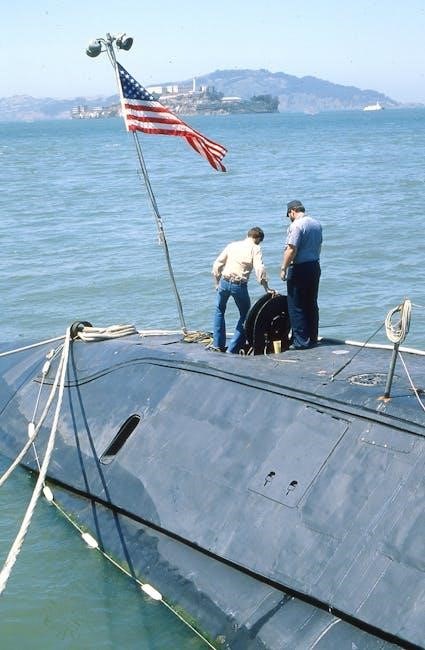Overview of the US Navy Urinalysis Program
The US Navy Urinalysis Program detects and deters drug use among personnel, ensuring security, readiness, and discipline. Mandatory for all, it tests for illegal substances, promoting a fit and disciplined force.
Purpose and Objectives
The primary purpose of the US Navy Urinalysis Program is to detect and deter illegal drug use among personnel, ensuring a safe, disciplined, and ready force. The program aims to identify substance abuse early, enabling timely intervention and support for sailors. By maintaining a zero-tolerance policy, the Navy upholds military readiness, security, and good order. Urinalysis testing also serves as a deterrent, discouraging drug use and promoting a culture of accountability. The program aligns with the Navy’s commitment to health, safety, and mission success, ensuring all personnel meet the highest standards of performance and conduct. Through regular testing, the Navy fosters a fit and resilient force, capable of meeting operational demands worldwide.
Policy and Procedures for Urinalysis Testing
The US Navy’s urinalysis program is governed by specific directives ensuring fairness and accuracy. Testing is conducted monthly, with specimens collected under strict protocols to maintain integrity and confidentiality, adhering to established procedures.
Random Testing and Specimen Collection
The US Navy conducts random urinalysis testing to ensure fairness and deter drug use. Specimens are collected under strict supervision to prevent tampering, with chain of custody maintained. Personnel are selected randomly via the Navy Drug Screening Program (NDSP) computer. Collections occur monthly, with new members tested within 72 hours of reporting. Privacy is upheld during collection, and specimens are sealed and labeled immediately. The Urinalysis Program Coordinator (UPC) ensures compliance with procedures, documenting every step to maintain integrity. Any irregularities are investigated to prevent fraud. This systematic approach ensures accurate and reliable results, supporting the Navy’s zero-tolerance policy on drug abuse.
Chain of Custody and Documentation
The US Navy emphasizes strict chain of custody for urinalysis specimens to ensure integrity. Each specimen is sealed, labeled, and documented upon collection, with identifiers verified by witnesses. The Urinalysis Program Coordinator (UPC) maintains positive control throughout the process, tracking specimens from collection to testing. Detailed records, including collection dates, times, and witness signatures, are kept to prevent tampering or loss. Any deviations from protocol are thoroughly investigated. Proper documentation ensures legal defensibility of test results. The Navy’s rigorous chain of custody process supports its zero-tolerance drug policy, maintaining trust in the program’s accuracy and fairness. This systematic approach guarantees the reliability of urinalysis testing, critical for maintaining military readiness and discipline.

Roles and Responsibilities
The Urinalysis Program Coordinator (UPC) oversees testing, ensuring compliance with Navy instructions. All personnel are responsible for participating in random screenings and providing specimens as required.
Urinalysis Program Coordinator (UPC) Duties
The Urinalysis Program Coordinator (UPC) manages the Navy’s drug testing program, ensuring compliance with instruction guidelines. Duties include scheduling and conducting random urinalysis screenings, maintaining chain of custody for specimens, and documenting all procedures. The UPC also reviews and updates program directives annually, ensuring alignment with current Navy policies. They are responsible for training personnel on proper collection and handling techniques to prevent tampering or contamination. Additionally, the UPC investigates discrepancies and ensures accurate test results. Their role is critical in maintaining the integrity of the program and upholding the Navy’s zero-tolerance policy on drug abuse.

Handling Positive Test Results
A positive test triggers an investigation to determine if the substance was prescribed or abused. Results are documented, and confidentiality is maintained to ensure fairness and transparency.
Investigation and Disciplinary Actions
Upon a positive test result, a thorough investigation is conducted to determine whether the substance was legally prescribed or illegally used. This process ensures fairness and accuracy. Commanding officers may initiate disciplinary actions, ranging from counseling to administrative separation, depending on the severity and circumstances. Legal consultation is often required to ensure compliance with military and civilian laws. Personnel rights are protected throughout the process, with opportunities to present evidence or explanations. The investigation and subsequent actions are documented to maintain accountability and transparency. This approach upholds the Navy’s zero-tolerance policy while safeguarding individual rights and ensuring justice is served. The goal is to address drug-related incidents decisively, maintaining a disciplined and fit force.

Legal and Compliance Aspects
The Navy’s urinalysis program adheres to federal laws and military regulations, ensuring privacy protections and transparency in testing procedures. It aligns with the Navy’s zero-tolerance drug policy, upholding legal standards and accountability.
Privacy Protections and Transparency
The US Navy ensures strict privacy protections during urinalysis testing, with collection conducted in private and results handled confidentially. Transparency is maintained through clear documentation and accessibility of test outcomes for service members, adhering to legal and ethical standards. The program upholds transparency by providing detailed procedures and ensuring accountability in specimen handling and result reporting. Service members are informed of their rights and the process, fostering trust and compliance with the program’s objectives. Privacy safeguards are integral to the program’s integrity, balancing public health and individual rights effectively.
Training and Resources
The US Navy provides comprehensive training for personnel involved in the urinalysis program, ensuring adherence to procedures and policies. Urinalysis Program Coordinators (UPCs) receive initial and recurrent training to manage specimen collection, chain of custody, and documentation. Additional resources include self-paced modules on Navy E-Learning platforms, covering program specifics and legal compliance. Service members also have access to instructional guides and updates on testing protocols. Regular updates and refresher courses ensure all personnel maintain proficiency. These resources aim to uphold the program’s integrity and effectiveness, fostering a culture of accountability and compliance. Training materials are readily accessible, ensuring seamless execution of the urinalysis program across all commands. Continuous education supports the Navy’s mission to maintain a drug-free and ready force.

The US Navy Urinalysis Program plays a critical role in maintaining a drug-free and disciplined force. By detecting and deterring substance abuse, it ensures operational readiness and national security. The program’s structured policies, training, and oversight foster accountability and transparency. It balances privacy protections with the need to maintain a safe and professional environment. Continuous updates and resources ensure the program remains effective and aligned with military goals. The urinalysis program is not only a tool for compliance but also a safeguard for the well-being of service members. Its success is vital to upholding the Navy’s values and mission, ensuring a ready and reliable force capable of meeting global challenges. The program’s enduring importance underscores its role in preserving the Navy’s tradition of excellence and integrity.